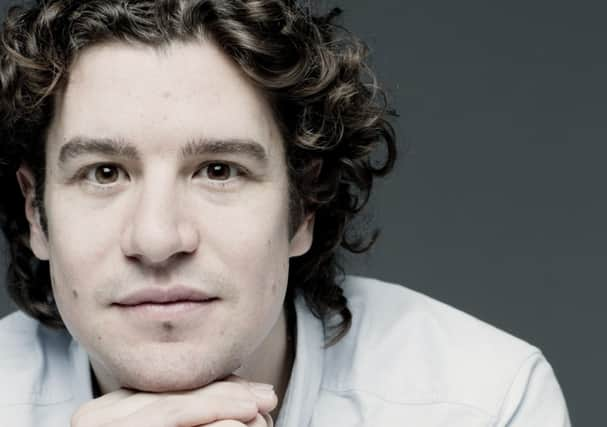Robin Ticciati’s love affair with the SCO resumes


“It still happens before every first rehearsal,” says the emotionally demonstrative 31-year-old, who this year added music director of Glyndebourne Festival Opera to his growing international CV, and who this week kicks off his seventh SCO season with a performance of Mahler’s Symphony No 4.
But the minute he sets foot on the SCO podium and gets down to work, he says, the jitters disappear. “It’s been like that since the very first time I conducted them. I immediately feel I’m at home.” Which is exactly what those of us listening to their relationship have sensed from the word go, and through a series of seasons in which Ticciati’s fresh thoughts on Berlioz and Schumann, both in concert and on disc, have been remarkable highlights.
Advertisement
Hide AdThese are not composers who necessarily fit the obvious profile of the average chamber orchestra. Yet, as Ticciati has shown, there are wild and unexpected fruits to be gleaned from such meaty Romantic repertoire when the emphasis is on clarity of texture and, as he puts it, “tuning in to the heartbeat of the music”.
So now it’s Mahler. And spread through the coming SCO season, beyond the Fourth Symphony opener, are performances next week of Kindertotenlieder and Blumine, then in January, Das Lied von der Erde. Common to all are Scotland’s leading mezzo soprano Karen Cargill, whose ongoing partnership with Ticciati and the SCO is part of the winning formula.
“These are pieces I know will sit incredibly well with the SCO,” he says. “I can already imagine woodland calls coming to life from our fantastic clarinets, or the filigree detail our players are so wonderful at delivering. But equally, there are areas of the score where I won’t know what I’m asking for until the point of rehearsal.”
He cites the climax of the third movement. “How will I make that happen? How can I build up the sound world required to make such a climactic moment work? What am I going to ask of the strings? What type of vibrato, or what bow speed? I’m looking at the score and having all these thoughts, but I can’t answer them just yet. It’s going to be a very interesting and exciting journey.”
Life is like that for Ticciati just now, where periods of relative stability – the three months each summer he spends at Glyndebourne with the London Symphony Orchestra – are offset by regular travelling dates to conduct the likes of the Swedish Radio and Cleveland Orchestras. There’s also the prospect this season of a residency at Vienna’s Konzerthaus, directing the Royal Concertgebouw and Vienna Symphony Orchestras, as well as the SCO and LSO.
Ultimately he finds greatest satisfaction in the embedded relationships. “With the SCO, it’s such an intense experience,” he explains. “You really get to know a group and as chief conductor you can demand so much more. Underlying everything is a respect and love, making it possible to push, to dare to achieve something really special.”
Advertisement
Hide AdThe Mahler focus is an obvious part of that daring strategy, but so, too, is Ticciati’s complementary focus on Haydn symphonies. He’s already embarked on that in previous seasons, but those we hear this season have been specially chosen as ones that can hold their own as the main closing work in a programme.
“Certain Haydn symphonies don’t work like that, and there are obvious ones that do, that always come up, like the late ‘London’ symphonies. I wanted to include a mix of pieces that aren’t done so much and would be the main course of the evening.” In fact, one of the more popular London ones – No 104 – accompanies next week’s Kindertotenlieder.
Advertisement
Hide AdThis week, though, the partner for Mahler 4 is the world premiere of a new harp concerto by Hiroshima-born composer Toshio Hosokawa – played at the Usher Hall by Naoko Yoshino – the link being the common inspiration from nature, and it’s presence is reflective of Ticciati’s other passion: to build brand new repertoire into the SCO’s regular programming. “There’s no end to what I want to bring to Scotland,” he says. And I suspect that what he refers to as nervousness is really just an irrepressible sense of excitement.
There’s likely to be plenty of that this coming season.
• Robin Ticciati conducts the Scottish Chamber Orchestra in Mahler’s Fourth Symphony at the Usher Hall, Edinburgh on 9 October and the City Halls, Glasgow, on 10 October, see www.sco.org.uk